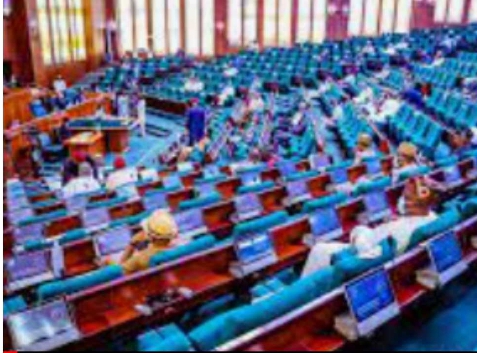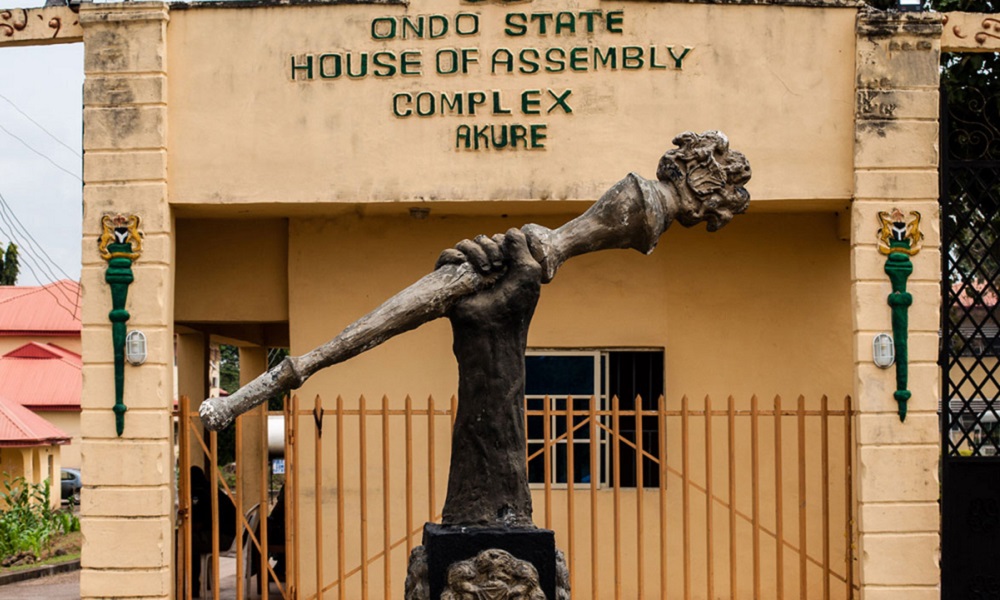News
‘Not Nigeria’s priority,’ lawmaker slams Reps’ proposed return to old national anthem

By Kayode Sanni-Arewa
A video featuring House of Representatives member, Ahmad Satomi, has gone viral on social media
The representative of Jere Federal Constituency, Borno State, challenged the Green Chamber regarding the recently passed National Anthem bill.
Satomi questioned the bill’s relevance to Nigeria’s pressing issues, sparking widespread discussion and debate.
The House of Representatives on Thursday passed for a second reading a bill seeking a return to the old national anthem, PUNCH Online reports.
Leading the debate on the general principles of the bill, the sponsor of the proposed law, Julius Ihonvbere, anchored his argument on the need for patriotism and nationalism.
But many Nigerians on social media questioned the relevance of the move, wondering if it would help salvage the nation’s economy, being Nigeria’s biggest challenge at the moment.
In the video, Satomi addressed his colleagues, questioning the practicality and impact of the bill, which mandates reverting to the old National Anthem, “Nigeria we hail thee.”
His concerns highlighted the disconnect between legislative actions and the real-world problems faced by Nigerians.
“I do not know how this national anthem will affect the well-being of the common man in Nigeria. Let’s be realistic.
“How will this support either hunger, banditry, or improve insecurity?” Satomi asked.
He emphasised the need for legislation that directly benefits the populace, rather than symbolic gestures.
Satomi urged his colleagues to prioritise development-oriented policies that would attract positive international attention and foster growth.
He expressed frustration over the focus on the national anthem while the world advances in technology and innovation.
“There is a saying that goes thus, ‘Countries that rely on prayers will rely on the ones that do think.’
“Please, let’s think of something that will bring progress, stability, and prosperity to the economy of this nation and improve the lives of the common man,” he urged.
Despite his objections, the House of Representatives, on Thursday, May 23, passed the bill with accelerated consideration.
The bill’s passage has sparked debate among the public and lawmakers about legislative priorities amid the nation’s ongoing struggles with hunger and insecurity.
News
Army acquires 43 drones, wings 46 Turkey-trained personnel

The Federal Government has bolstered the Nigerian Army’s operational capacity with the acquisition of 43 Bayraktar TB2 drones, primarily for deployment in the North-West theatre of operations.
The Commander of the Nigerian Army Space Command, Brig. Gen. U.G. Ogeleka, disclosed this on Tuesday during the winging ceremony of 46 personnel trained in the operation and maintenance of the drones.
The initiative, codenamed Project Guardian, aims to strengthen military operations against insurgency and other security challenges in the region.
“Between May and September 2022, a team of 35 officers and 11 soldiers from the Nigerian Army’s routinely piloted aircraft system regiments underwent specialised training in Turkey on the operation and maintenance of the Bayraktar TB2 drones,” Ogeleka said. “The training crew included multi-piloted aircraft pilots, mission operators, avionics, and mechanical engineers and technicians.”
Out of the 46 trained personnel, 14 are multi-piloted aircraft pilots, seven are mission operators, and 23 are engineers and technicians.
Ogeleka presented 22 of the trained personnel for the winging ceremony, noting that the others are actively engaged in operational duties.
The Chief of Army Staff, Lt. Gen. Olufemi Oluyede, praised the acquisition of the drones and the training of personnel as significant steps toward enhancing the army’s professionalism and combat readiness.
“The winging of these 22 officers and soldiers as pilots and certified maintenance engineers is a morale booster for others in service,” Oluyede said. “It confirms their readiness to operate and maintain the Turkish Bayraktar TB2 drones in our inventory.”
Oluyede further revealed plans to procure additional unmanned aerial systems in the coming year to strengthen military operations across all theatres in the country.
The drones will play a critical role in addressing security challenges in the North-West, a region plagued by banditry and insurgency.
Their advanced surveillance and strike capabilities are expected to significantly enhance the Nigerian Army’s operational effectiveness.
This development underscores the government’s commitment to leveraging technology to improve national security and highlights the Nigerian Army’s drive to modernize its arsenal and build capacity within its ranks.
With more unmanned aerial systems set for acquisition, the military’s ability to conduct precise, real-time surveillance and combat operations is poised for substantial improvement.
News
Ondo Assembly mulls 10-year jail term for land grabbers

The Ondo State House of Assembly is considering a bill that proposes harsh penalties for land grabbers, including up to 10 years imprisonment for forceful entry or illegal takeover of properties.
Governor Lucky Aiyedatiwa has further reinforced the fight against land grabbing by signing an Executive Order to prohibit such activities.
The order aims to end forceful entry, illegal occupation of landed properties, and fraudulent or violent conduct related to land in the state.
To strengthen enforcement, the governor has established a Task Force to protect property rights, uphold the rule of law, and ensure a secure environment for property owners and residents.
The proposed bill also includes severe penalties of up to 21 years imprisonment for selling family land without the consent of the family head or secretary.
Hon Moyinolorun Ogunwumiju, the lawmaker representing Ondo West Constituency 1, who sponsored the bill, spoke during a public hearing on the bill
Hon Ogunwumiju assured stakeholders that the bill would improve land administration, protect landowners, attract investors, and foster peace and development in the state.
He explained that the bill sought to regulate land dealings, protect landowners and buyers, penalise encroachers, and criminalise unregistered agents.
Ogunwumiju said the bill proposed penalties of up to 10 years’ imprisonment for forceful entry or takeover of properties and up to 21 years for selling family land without the consent of the family head or secretary.
Speaker of the Assembly, Hon Olamide Oladiji, urged committee members and stakeholders to ensure the bill served the interests of the people.
He said the bill would maintain order in the state and impose necessary sanctions on offenders.
“Land grabbers pose a significant threat to property acquisition. Their activities ranging from trespassing, forceful occupation, and illegal sales of properties to multiple buyers must be confronted decisively.”
Majority Leader and Chairman of the House Committee on Rules and Business, Oluwole Ogunmolasuyi, said the bill, would benefit the society at large
Ondo Commissioner for Justice and Attorney General, Kayode Ajulo said the bill would enhance land administration and complement the executive order signed by Governor Aiyedatiwa.
Stakeholders including traditional rulers called for full implementation of the bill when signed into law.
News
FG earmarks N250bn for Lagos-Abuja rail project in 2025 budget

The federal government has made an allocation of N250 billion in the 2025 budget for the Lagos–Abuja mass transit rail project.
This budgetary investment is part of a broader plan to revitalize Nigeria’s infrastructure and stimulate economic growth.
The government’s focus on infrastructure development is rooted in the belief that it is a cornerstone of long-term economic planning.
By investing in critical infrastructure such as roads, railways, energy, healthcare, and education, the administration aims to create a conducive environment for both domestic and foreign investment.
The Lagos-Abuja rail project, in particular, is expected to have a transformative impact on the Nigerian economy.
By improving transportation connectivity between two major economic hubs, the project will facilitate the movement of goods and people, reduce logistics costs, and stimulate economic activity.
Additionally, the project is expected to create numerous jobs, both directly and indirectly, contributing to the country’s overall employment rate.
The government’s infrastructure investments are also aimed at addressing regional disparities.
By connecting different parts of the country through improved transportation networks, the administration hopes to stimulate economic growth in underserved regions, reduce poverty, and promote equitable development.
The 2025 budget signals the government’s commitment to transforming Nigeria’s infrastructure landscape.
By investing in critical projects like the Lagos-Abuja rail line, the administration aims to lay the foundation for a more prosperous and connected Nigeria.
However, the success of these initiatives will depend on effective planning, efficient implementation, and transparent governance.
-

 News23 hours ago
News23 hours agoGov Adeleke Speaks On Death Sentence For Chicken Thief
-

 News23 hours ago
News23 hours agoDelta Assembly pardons two suspended members
-

 News19 hours ago
News19 hours agoNetizens Slam Lawmakers As They Sing Tinubu’s Anthem At Budget Presentation
-

 News16 hours ago
News16 hours agoFinally, PDP Flushes Out Suspended National Vice Chairman, Ali Odefa
-

 News23 hours ago
News23 hours agoJust in: CBN Imposes N100k Bar on PoS, Issues Warning to Operators
-

 News13 hours ago
News13 hours agoReps Call for Revival of NAPAC to Boost Transparency, Accountability
-

 News23 hours ago
News23 hours agoHeavy Security Presence at National Assembly as President Tinubu Presents 2025 Budget
-

 News12 hours ago
News12 hours agoReps Recommends Delisting NECO, UI, Labour Ministry, 21 Others From 2025 Budget








